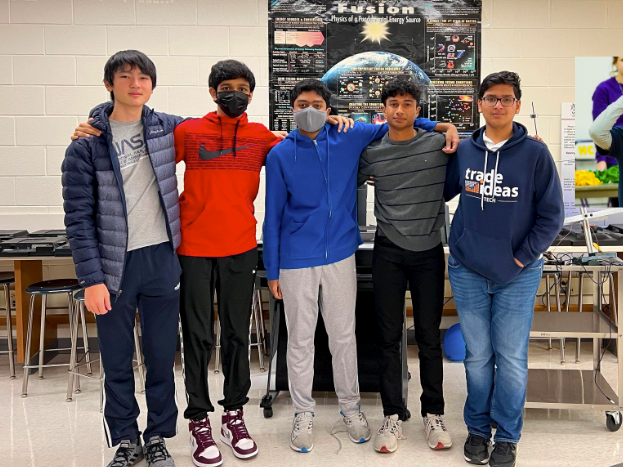As fast as light
Juniors Steven Lu, Dhruv Anurag, Sathvik Redrouthu, Pranav Velleleth and Pranav Vadde are part of Procyon’s team. Because Procyon involves developing applications of physics, members are able to use their knowledge in a real-world way. “I feel like Procyon is a place where I can really nerd out, because in AP Physics you’re limited to all these textbook problems,” junior Ryan Kim said. “But in Procyon, I can design things.”
December 6, 2022
No computer can be faster than light, but a group of Jefferson students are trying to come close to this limit. Procyon is a student-led organization focused on photonics, the scientific study of the applications of light.
“I created Procyon sort of on a whim, since I wanted to see if we could build a light speed computer. We thought, ‘What if we make one that uses lasers?’” junior Sathvik Redrouthu said.
Guided by this question, Redrouthu began to explore the possibilities surrounding photonics. As he learned more about the field, he realized that a laser-powered computer could be useful.
“Conventional computers are powered by electricity, but our computer uses lasers because lasers are faster than electricity,” Redrouthu said. “They have no heat and are completely cool systems.”
Procyon aims to mass produce photonic chips that can be used in all computers. So far, they have built a computer chip and a programming language to run computations on the chip.
“In the past year, we designed a silicon microchip that is able to compute matrix multiplication and tensor algebra,” junior Ryan Kim said. “We’re the first organization in the world to run tensor algebra on an optical chip.”
Because photonics is a relatively new field, it provides many opportunities for new discoveries. Redrouthu predicts that photonics will expand and have a greater impact on computers.
“I learned that photonics has a lot more potential than I realized. I know a lot of big companies, like Google and IBM, are trying to push towards photonics,” Redrouthu said. “I feel like in the future, it’s going to quickly take over electronics.”
From an idea to a physical chip, Procyon has come a long way. Redrouthu hopes to continue their work and eventually reach a scale where they could support other companies running algorithms on Procyon’s system.
“I think we’ve made pretty cool progress,” Redrouthu said. “There were four months where we had no idea what to do, but we had a breakthrough and were able to design the chip.”
Despite the challenges, Redrouthu remains optimistic about Procyon’s development. He encourages other students to pursue projects they are interested in, even if they don’t have much previous experience with the topic.
“The main thing that I’ve learned is that you shouldn’t let what you know now stop you from doing anything in the future,” Redrouthu said. “Even if you’re 16, you can take advantage of what’s around you and do really cool things.”






